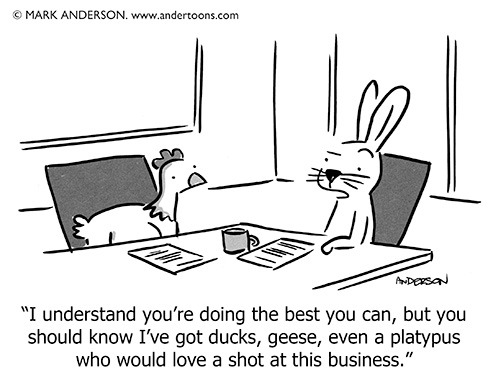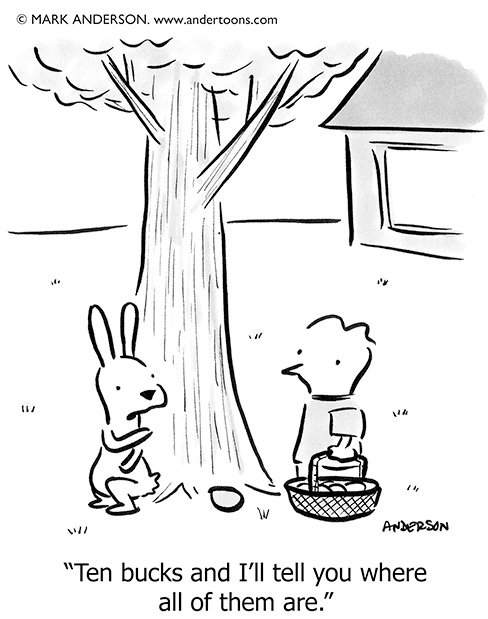Cartoons by Mark Anderson






Police came to the aid of a 3-year-old boy after he became trapped inside a claw machine at a suburban shopping mall in Australia.
Video of the unusual rescue one Saturday was shared on social media by Queensland Police. It showed the toddler sitting inside the glass-walled box filled with plush toys, blissfully unaware of his predicament.
The boy’s father, Timothy Hopper, said his son had disappeared into the claw machine’s prize dispenser and was inside it in a “split second.”
“I had zero chance to react. It was unbelievable how fast he climbed up there,” the Australian Broadcasting Corporation reported Mr. Hopper saying.
The video then shows the officers and the boy’s parents encouraging him into a safe corner at the back of the machine, and to cover his eyes while the police shatter a glass panel to free him unharmed.
The video ends with one of the officers joking with the boy, “You won a prize. Which one do you want?”
A woman fell into a dumpster while throwing out her garbage and was later rescued from a trash truck that had compacted the contents while she was inside, fire department officials in New Hampshire said.
Luckily, neighbors heard her screams and the trash compartment was equipped with a camera. The driver spotted the woman stuck inside and called 911. By then, the driver “had reportedly compacted the garbage up to four times,” the Manchester Fire Department said in a news release.
Rescuers used a basket ladder to reach the top of the truck and lift her out. By then, she was “standing/talking/yelling, but was not alert enough to answer questions,” the news release said.
The woman was taken to a hospital after that Monday’s misadventure. Her name was not released.
“In 32 years, I’ve never seen anything like this my whole career,” Battalion Chief Bob Beaudet told WMUR-TV. “It’s alarming, because you don’t really think something like this could true.”
An American scientist has sparked a trans-Atlantic tempest in a teapot by offering Britain advice on its favorite hot beverage.
Bryn Mawr College chemistry professor Michelle Francl says one of the keys to a perfect cup of tea is a pinch of salt. The tip is included in Francl’s book “Steeped: The Chemistry of Tea,” published by the Royal Society of Chemistry.
Not since the Boston Tea Party has mixing tea with salt water roiled the Anglo-American relationship so much.
The salt suggestion drew howls of outrage from tea lovers in Britain, where popular stereotype sees Americans as coffee-swilling boors who make tea, if at all, in the microwave.
“Don’t even say the word “salt” to us...” the etiquette guide Debrett’s wrote on X, formerly known as Twitter.
The U.S. Embassy in London intervened in the brewing storm with a social media post reassuring “the good people of the U.K. that the unthinkable notion of adding salt to Britain’s national drink is not official United States policy.”
“Let us unite in our steeped solidarity and show the world that when it comes to tea, we stand as one,” said the tongue-in-cheek post. “The U.S. Embassy will continue to make tea in the proper way - by microwaving it.”
The embassy later clarified that its statement was “a lighthearted play on our shared cultural connections” rather than an official press release.
“Steeped,” in contrast, is no joke. The product of three years’ research and experimentation, the book explores the more than 100 chemical compounds found in tea and “puts the chemistry to use with advice on how to brew a better cup,” its publisher says.
Francl said adding a small amount of salt — not enough to taste — makes tea seem less bitter because “the sodium ions in salt block the bitter receptors in our mouths.”
She also advocates making tea in a pre-warmed pot, agitating the bag briefly but vigorously and serving in a short, stout mug to preserve the heat. And she says milk should be added to the cup after the tea, not before – another issue that often divides tea lovers.
Francl has been surprised by the level of reaction to her book in Britain.
“I kind of understood that there would hopefully be a lot of interest,” she told The Associated Press. “I didn’t know we’d wade into a diplomatic conversation with the U.S. Embassy.”
It has made her ponder the ocean-wide coffee-tea divide that separates the U.S. and Britain.
“I wonder if we’re just a more caffeinated society — coffee is higher in caffeine,” she said. “Or maybe we’re just trying to rebel against our parent country.”